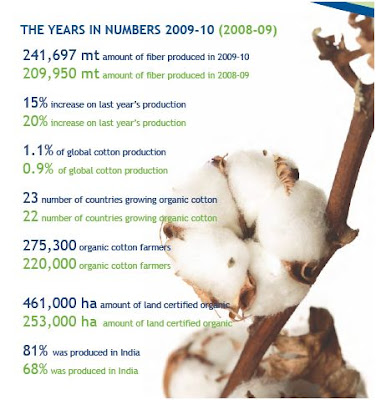| PRESS RELEASE / TEXTILE EXCHANGE |
India Tops Organic Cotton farming with
80% Of Global Production
 India remained the top producing nation in 2009‐10 for the third straight year, growing over 80 percent of the organic cotton produced globally and increasing its production of the fiber by 37 percent over 2009‐2010, according to the fifth annual Organic Farm and Fiber report by Textile Exchange (“the Exchange”), the leading global organic cotton and sustainable textiles non‐profit organization formerly known as Organic Exchange.
India remained the top producing nation in 2009‐10 for the third straight year, growing over 80 percent of the organic cotton produced globally and increasing its production of the fiber by 37 percent over 2009‐2010, according to the fifth annual Organic Farm and Fiber report by Textile Exchange (“the Exchange”), the leading global organic cotton and sustainable textiles non‐profit organization formerly known as Organic Exchange. Overall, despite the recession, organic cotton continued its steady growth owing to high manufacturer demand, in 2009-2010, says the Organic Farm and Fiber report.
According to the report, production of organic cotton rose up to 15 per cent from 209,950 metric tonnes (MT) in 2008-09 to 241,276 MT (just over 1.1 million bales) grown on 461,000 hectares (1.14 million acres) in 2009-2010.
Organic cotton now represents 1.1 per cent of global cotton production. It has witnessed a 539 per cent increase in production in the last four years since 2005-06, when only 37,000 MT was produced in 22 countries. The number of organic farmers has risen to 274,000 with recent addition from Tajikistan. Textile Exchange anticipates similar strong growth in 2011.
Following India in production are, Syria, Turkey, China, United States, Tanzania, Uganda, Peru, Egypt, Mali, Pakistan, Burkina Faso, Israel, Benin, Paraguay, Greece, Tajikistan, Senegal, Nicaragua, South Africa, Brazil, and Zambia.
According to LaRhea Pepper, Textile Exchange Senior Director, “We will see market growth continue at a minimum of 20 percent per annum with stronger growth of 40 percent or more in markets and programs that have both strong commitment and corporate support; especially when brands have made strong linkages for stable supplies of organic fiber. Value chain relations are now more important than ever. Continued growth is expected in 2011 due both to continued support and greater awareness on the part of consumers as well as the strong commitments from key brands and retailers to increase and expand their organic and sustainable textile programs.Manufacturers, retailers and consumers, and most importantly, farmers, all signaled their continued interest in supporting organic cotton production and the risks that came with it despite the recession."


No comments:
Post a Comment